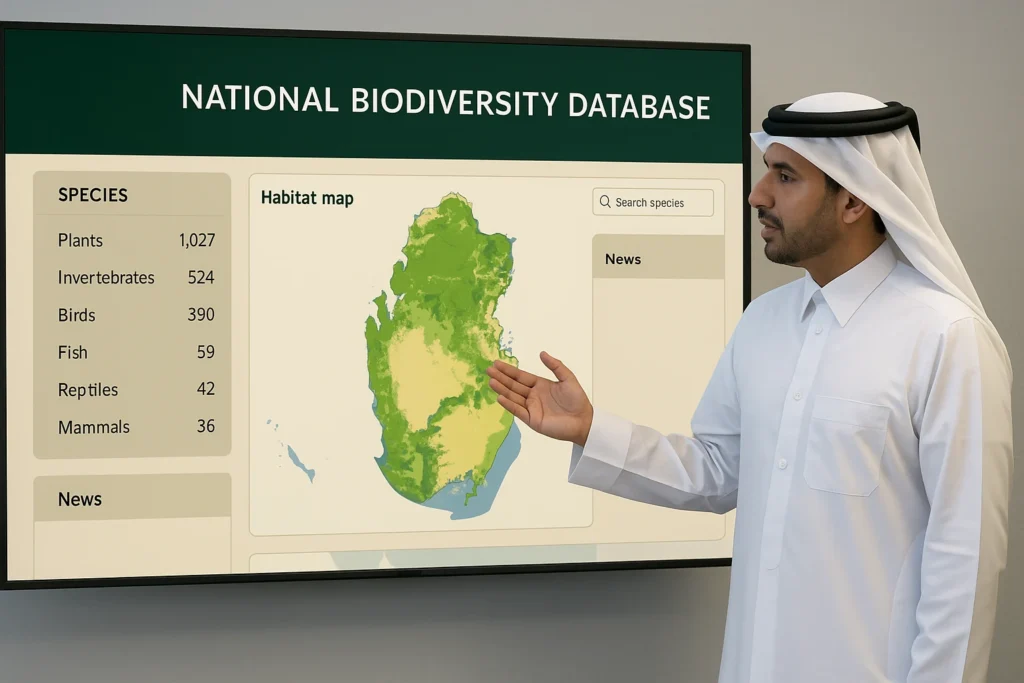
In June 2025, Qatar took a landmark step toward environmental sustainability by launching its National Biodiversity Database. Designed as a centralized electronic platform, this database marks a transformative moment in how the country manages, protects, and understands its rich flora and fauna. With more than 2,000 species catalogued to date, the database symbolizes Qatar’s commitment to advanced ecological governance and aligns with its broader Vision 2030 for a balanced national development.
Developed by the Ministry of Environment and Climate Change (MECC), the National Biodiversity Database is an interactive, web-based system that:
Accessible via biodiversity.mecc.gov.qa, the platform currently catalogs 1,027 plants, 524 invertebrates, 390 birds, 59 fish, 42 reptiles, and 36 mammals.
By offering up-to-date distribution maps and data trends, the database empowers MECC, government agencies, and consultants to craft and implement effective conservation strategies.
Developers can reference biodiversity hotspots, thereby adjusting project footprints. Public consultations and permit reviews are now better supported, reflecting Qatar’s responsible approach to urbanization.
The wealth of data helps Qatar produce evidence-driven environmental reports, fulfilling obligations under frameworks like the Convention on Biological Diversity and aligning with Vision 2030 goals.
With features like species profiles and habitat distribution visualizations, the database enhances environmental literacy and community involvement—vital steps toward national ownership of biodiversity protection efforts.
The database was officially unveiled on 5 June 2025, coinciding with World Environment Day celebrations. During the ceremony, MECC’s Minister, H.E. Dr. Abdullah bin Abdulaziz bin Turki Al Subaie, called the database “a strategic milestone in Qatar’s environmental journey.” He emphasized its role in advancing governance, sustainability, and informed decision-making.
The launch featured a Principal User Document signed with institutions like Qatar University, Hamad Bin Khalifa University, and the Qatar National Library, underscoring a multi-institutional, knowledge-sharing approach.
The platform’s knowledge hub supplies newsletters, updates, best practices, and case studies—serving as an invaluable resource for environmental professionals and advocates.
The database is not an isolated tool—it’s tied into global biodiversity efforts:
Private sector environmental consultancies in Qatar can also benefit from this data. For instance, access to a structured biodiversity system allows professionals to conduct impact assessments, propose site-specific ecological recommendations, and align project planning with national goals. Organizations such as WAEY Environmental Consultancy & Trading may find this resource valuable in shaping data-informed environmental strategies.
MECC plans ongoing enhancements:
This database fits within a broader wave of environmental innovation:
These efforts collectively underscore a shift toward evidence-based, data-driven environmental stewardship.
Qatar’s National Biodiversity Database is more than a digital catalog—it’s an environmental milestone. Serving scientists, policymakers, educators, and developers, it strengthens resilience and stewardship for current and future generations.
With continued updates, cross‑sector collaboration, advanced mapping, and community inclusion, Qatar is firmly on its path to becoming a global exemplar in biodiversity management and climate-sensitive development.
Explore the National Biodiversity Database today, and join the movement for a more sustainable, data-informed, and environmentally resilient Qatar.